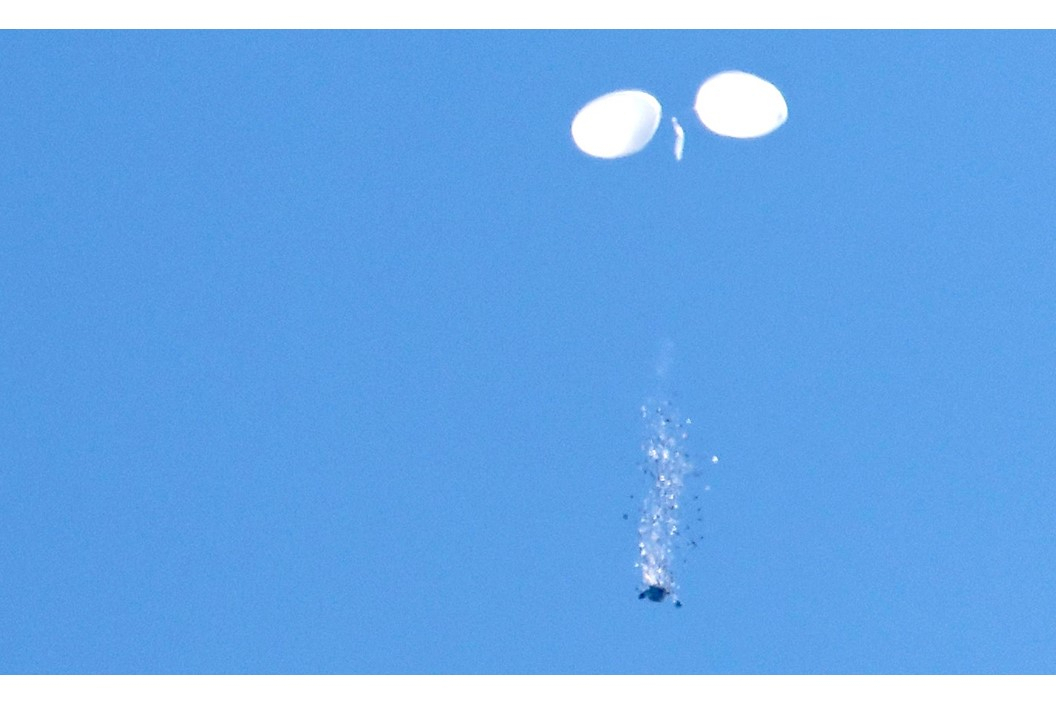
 |
| Trash balloons released by North Korea burst over Seoul on Oct. 4, with their contents falling from the skies. North Korea has sent over 6,000 trash-carrying balloons at South Korea since May. (Yonhap) |
The US-led United Nations Command said South Korea broadcasting anti-Kim Jong-un propaganda through loudspeakers along the border with North Korea have encouraged, rather than deterred, North Korea’s launches of balloons carrying trash toward the South, according to a Seoul Joint Chiefs of Staff memo obtained by The Korea Herald.
The anti-Pyongyang broadcasts by South Korea “failed to deter the North Korean trash balloons” and “gave North Korea an excuse for additional launches,” the UN Command found after a special investigation, the memo dated Oct. 11 read.
The UN Command, tasked with enforcing the armistice ending the Korean War, also said South Korea entering the Demilitarized Zone, installing the loudspeakers there and playing the propaganda broadcasts each amounted to a violation of the armistice. The South Korean military did not have the UN Commander’s approval.
The Military Armistice Commission of the UN Command on Oct. 10 relayed the conclusion of its special investigation to the Defense Ministry’s North Korea Strategy Division and Joint Chiefs of Staff’s Joint Operations Branch.
According to the memo, South Korean Minister of National Defense Kim Yong-hyun said the findings by the UN Command were “unacceptable.” The minister asked that a request be made for the UN Command to reassess the conclusion reached in the special investigation and for ongoing negotiations on other issues to be put on hold for the time being.
At the South Korean minister’s instructions, the director of the JCS Directorate of Operations held a call with the UN Command director of operations at 11:45 on Oct. 11. The chief of the Defense Ministry Policy Planning Bureau and the UN Command chief of staff also spoke over the phone at 13:00 the same day.
In the call, the UN Command side reconfirmed that the South Korean military had committed the violations. The South Korean defense minister then ordered that a letter of protest be sent to the UN Command.
The memo contained the Seoul Defense Ministry’s rationale for playing the broadcasts at Pyongyang, which it viewed as a matter of “right to self-defense” and a “response to North Korea’s illegal acts,” namely the trash balloon launches.
The memo showed that the ministry was attempting to counter the UN Command’s conclusion with the logic that the anti-Pyongyang broadcasts were “necessary, nonphysical measures of self-defense to deter North Korea’s acts of hostility” and that the North Korean trash balloons were earlier deemed a breach of the armistice as well.
The broadcasts also fit the “principle of reciprocity,” as the number of balloons North Korea sent over on 27 occasions totaled 6,283 to date. North Korea had carried out other “nonmilitary” provocations such as GPS jamming attacks at least 108 times to date.
“The broadcasts at North Korea should continue until North Korean military’s hostile acts stop,” the ministry said in the memo.
The memo revealed that the UN Command had turned down the South Korean military’s June 9 request to enter the demilitarized zone to install the loudspeakers for the anti-Pyongyang broadcasts, on account of its potential to escalate the crisis. But the ministry said in the memo “measures of self-defense” would not require the UN Commander’s approval.
In a phone call with The Korea Herald, a senior official of the Defense Ministry said he was not aware of anything beyond the UN Command special investigation having taken place. Another senior official who is said to have briefed the minister regarding the UN Command conclusion, according to the memo, denied having any knowledge of the correspondence.
The UN Command said it was unable to confirm The Korea Herald’s inquiries on the recent communication with the Defense Ministry in Seoul about its special investigation.
South Korea on June 9 announced that it would resume the border broadcasts, halted since a 2018 inter-Korean military agreement, as a response to North Korea repeatedly launching balloons carrying trash into the South. Beginning May 28, North Korea has continued to send to the South waste-carrying balloons over multiple occasions. Following the South Korean broadcasts, North Korea then began airing pro-Kim Jong-un broadcasts in border areas in retaliation.









